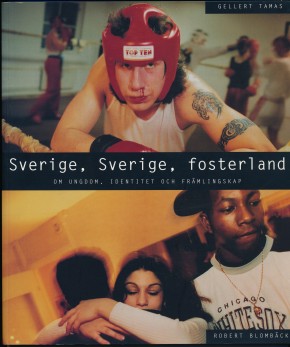Sweden, Sweden Fatherland

“An uncommonly intelligent book. The author Gellert Tamas is dedicated. Robert Blombäck is a brilliant photographer of a kind that has become rare in Sweden.”
Jan Gradvall, Nöjesguiden.
Sweden in the early 1990’s. The country is going through the worst economic crisis since the 1930’s. The xenophobic, right-wing populist Ny Demokrati (“New Democracy”) is elected into the parliament. The organisation VAM, Vitt Ariskt Motstånd (White Arian Resistance), declares war on the “race mixing society”, transit houses for asylum seekers are attacked, crosses are burned and the racist serial killer, the Laserman, attacks again and again. And while the Minister of Justice asks concerned residents of the Stockholm suburb Rinkeby, dominated by immigrants, to sing “We shall Overcome”, members of the xenophobic party The Swedish Democrats (Sverigedemokraterna) march through the streets of Stockholm shouting slogans such as “Laserman shoot to kill”.
This is the backdrop to Gellert Tamas’ and Robert Blombäck’s classic reportage book Sweden, Sweden Fatherland. For four years they followed young Swedes in a country undergoing great changes. In a series of dense close-up reportages we meet the suburban gang from Husby, the skin head that denies the Holocaust, members of the supporter club Black Army and young Swedish Muslims. And many, many more.
”It has a bit of West Side Story, a bit of Clockwork Orange, a bit of the children’s game ‘The White and the Red Rose’ – but it also has a lot of quite uncomfortable current Swedish reality.”
Per Svensson, Expressen
“A number of brilliant reportages… an incredibly important time document, written close to the events and close to the new language that is spoken in the ghettos and the underground, with congenial photographs.”
Magnus Roselius, Amnesty Press
”It’s written in a way that makes it accessible for both young and old, both native Swedes and immigrants… When I brought it to work I barely managed to get it back home again.”
Jonas Agdur, Arbetaren
“The lack of patronising or servile understanding is the book’s foremost quality. Straight on, simply and unsentimentally it shows us the real and essential content of the rows of numbers and tables – the person.”
Thabo Motsieloa, tidningen Oberoende
”The coolest book ever!”
Dogge Doggelito, Tidningen Södermalm
”It ought to be read by all policymakers at least.”
Jesper Strömbäck, Sundsvalls Tidning
